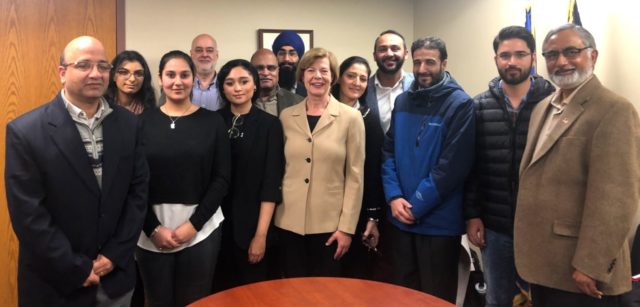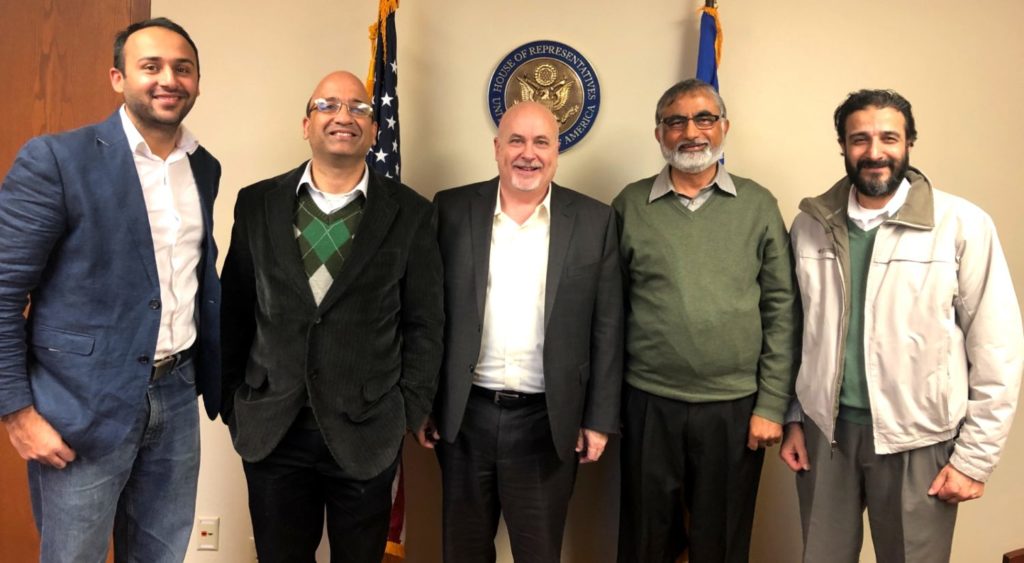
“Right now, what is happening in India is very alarming. It’s going to take people not only coming out on the street but also our elected officials to speak up against this,” says Masood Akhtar.
Akhtar, an-Indian born Muslim activist who has made his home in the Madison area for more than 30 years, is very concerned about his home country. Indian religious minorities have faced increased violence under the regime of Prime Minister Narendra Modi, a fierce Hindu nationalist. There has been a sharp rise in hate crimes against Muslims, especially, such as lynching, threats, attacks on places of worship and forced conversion.
A 10-minute-long video of a brutal lynching of a young Muslim man this past summer has shocked Indian Muslims. The man was tied to a pole and then severely beaten for an alleged burglary as a crowd forced him to shout “Jai Shri Ram,” which means “Hail Lord Ram” — a slogan widely used by Hindu hardliners.
“Initially, Modi was elected based upon promises of revitalizing India talking about good things he was doing through a business perspective,” Akhtar tells Madison365. “What really happened is that he didn’t do anything. Large amount of jobs were lost and the economic situation in India was really bad. A lot of people are unemployed.”
The unemployment in India is now at a 45-year high.
“Modi changed the narrative following the U.S. model. His slogan was that India could change to the Hindu country. Eighty percent of the population is Hindu in India. It was very alarming,” Akhtar says. “They are now introducing this piece of legislation – some of it has already been approved – that singles out minorities, particularly Muslims. They are requiring a lot of paperwork to show that you are born in this country.”
Lynchings of the country’s minorities have surged over the last five years. In February, Human Rights Watch reported at least 44 such murders between May 2015 and December 2018.
Akhtar contends that Modi is very much like President Donald Trump in that both leaders and their administrations continue to promote anti-minorities rhetoric.
“The sad part is when the [Indian] prime minister came to the United States recently in Houston, he had already crushed so many minorities and sent so many troops to Kashmir. Our president went to this event and said no word – no statement against what Modi is doing,” Akhtar says. “That’s where I think we are struggling – these two guys have the same agenda – to crush minorities. Both of these politicians play on emotions and fear.
“Modi has shown very clearly that he wants to turn this country into a Hindu country and completely ignore the Constitution,” he continues. “The good news is that he did not anticipate that there are so many people Hindus, Christians, Jews, you name it, men, women, young and old … they all came out in the streets of India. Everywhere. Protesting against this and reminding him about the Indian constitution.”
Akhtar feels like it is an important time to put pressure on the Modi government not to discriminate against minorities, particularly Muslims. That was the purpose of recent meetings Akhtar and a large group of people had with U.S. Sen. Tammy Baldwin and U.S. Representative Mark Pocan.

“Both of them were very willing to listen to the situation in India. I had people with me from Kashmir, people who were of the Hindu religion, Sikh religion, Muslim religion and we met with both officials and shared our concerns,” Akhtar remembers. “Both Sen. Baldwin and Rep. Pocan, despite their very busy schedules, made time to talk about these important issues. They both supported us and agreed to work with us.”
The meeting with Baldwin took place at her downtown Madison office and included a dozen members who discussed “Minorities under threat under Prime Minister Narendra Modi and Call to Action”.
“Of the big group of people that met with Tammy Baldwin, we all have family and friends who are over in India and Kashmir who are being hurt right now,” Akhtar says. “It’s very personal for us and we really appreciated her listening to what we had to say.”
Akhtar is the founder of We Are Many-United Against Hate, a nonpartisan, nonprofit organization of common people that seeks equal protection for all, united against hate, bigotry and racism. He says he has many very fond memories of India growing up, but things have changed dramatically. There is a fear right now that is disturbing.
“That’s not the India I once lived in. I lived in a city that was 50 percent Muslim and 50 percent non-Muslim, mostly Hindus. And you can’t tell the differences,” he says. “We used to go to weddings and celebrations and funerals together and you couldn’t tell the difference. Now, it’s such a scary environment. Things are going in a very wrong direction and the economic situation is so bad that is easy for Modi to create fear.”
Akhtar says that it’s very important that the people in the United States know what’s going on in India right now … and for, at some point, them to speak up, too.
“I think it’s so important to educate our people [here in America] on the issues that they may not be up to speed on what’s happening on the ground in India,” he says. “The good news is what I’ve been seeing from the people of India. These people are coming out from nowhere opposing all of these things that are going to be happening. It’s not just Muslims doing it; it’s a lot of people coming out and speaking against it. That speaks volumes about what really India is and what India should be.
“We have to make sure that we use all of the resources to make sure that India remains India,” he adds. “The way India was before.”

































